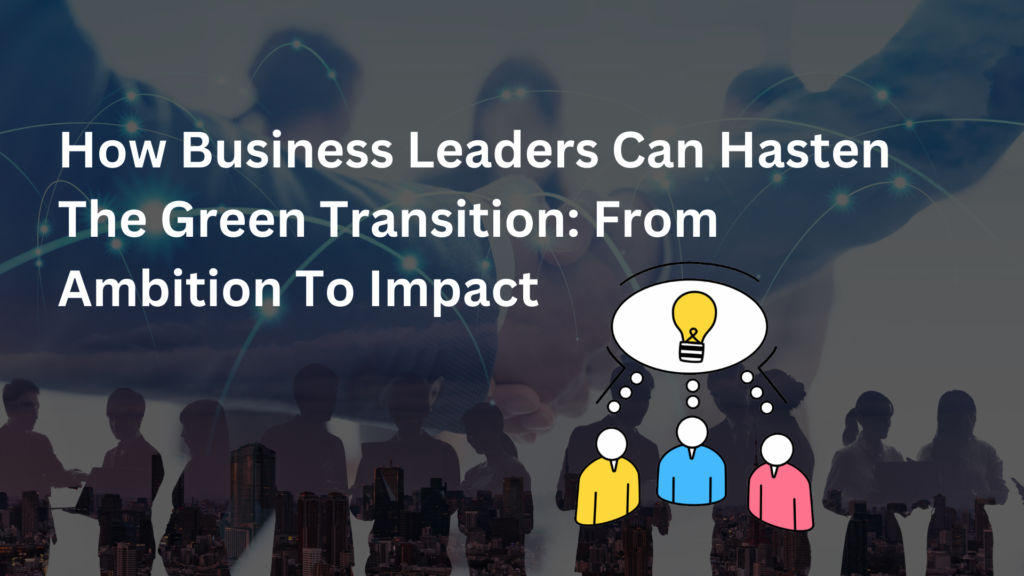CXO
UPDATES
How Business Leaders Can Hasten The Green Transition: From Ambition To Impact
In spite of economic and geopolitical uncertainties, 75% of C-level executives (CxOs) in the most recent poll said their companies have boosted sustainability spending over the previous year.

The year 2022 ought to have dispelled any lingering doubts regarding the sustainability of the business agenda in relation to climate change. A growing number of weather-related catastrophes that affected individuals, businesses, and economies occurred all across the world. At the same time, we observed a growing consensus among corporate leaders regarding the urgency of addressing climate change and the need to move responsibly toward a decarbonized economy.
2023’s CxO Sustainability Report states that despite the obstacles that CxOs faced in the previous year, such as talent shortages, supply chain disruptions, geopolitical turmoil, and economic instability, climate change continues to be a top priority for their firms. And they are doing something about it.
Nearly all respondents in a poll of more than 2,000 CxOs from 24 countries said that over the past year, climate change had some kind of negative impact on their organisations. More than 80% of CxOs claimed to have experienced personal effects, and 62% indicated they are perpetually concerned about the effects of climate change. Climate change was ranked as one of the “top three issues” by many CxOs, ahead of supply, innovation, and seven other factors.
Climate change concerns are increasing, but optimism persists
According to our discussions with business executives, the majority of CxOs (78% of those questioned) are still hopeful that enough will be done to prevent the worst effects of climate change. They both feel compelled to act immediately as well. The good news is that C-suite leaders are still committed to funding sustainability and climate change programmes, even as we anticipate an unpredictable economic cycle in the upcoming year.
Climate change will have a very/very significant impact on their organisation’s strategy and operations during the next three years, according to many CxOs (61%) Additionally, 75% of respondents claimed their companies have increased their investments in sustainability during the past year. There is also widespread acceptance.
Additionally, it is widely acknowledged that for solutions to advance, the entire ecosystem of private, public, and nonprofit organisations must work together.
The board and management, consumers, and employees are just a few of the stakeholder groups that are pressing organisations to take action. More than half of CxOs reported that during the past year, their organisations’ sustainability efforts have increased as a result of employee involvement on climate issues. Regulation also has an impact; according to 65% of CxOs, their organisation has increased its climate action as a result of the evolving regulatory environment.
Climate action continues, but challenges remain
Organisations are acting: 59% are utilising more environmentally friendly materials, 59% are improving energy efficiency, 50% are educating staff about climate change, and 49% are creating brand-new eco-friendly goods or services. Additionally, they are stepping up their efforts to adapt to climate change. 43% of them are updating or moving their facilities to make them more resilient to climate change, 40% are buying insurance to protect against extreme weather risks, and 36% are providing financial aid to employees who have been negatively affected by extreme weather.
However, while organisations are taking action, inconsistencies and gaps persist, as we observed in the study from the previous year. For instance, according to 21% of chief executive officers, their companies don’t intend to link senior leader compensation to environmental sustainability performance, and 30% said they don’t intend to advocate.
Only 29% of CxOs said they think the corporate sector is “extremely” serious about solving climate change when questioned about their opinions on the seriousness of various groups in this regard. Only 46% of respondents state that their organisations find it “very important” to ensure a “fair transition”*, and opinions on this matter vary substantially by region and nation.
Recommendations to quicken the switch to green
According to a 2023 poll, CxOs think that the growth of their companies as well as the global economy can be sustained while achieving climate targets and cutting greenhouse gas emissions. The organisations are slower to execute the “needle-moving” measures that integrate sustainability into the core of their strategies, operations, and cultures, thus there is still a gap between acts and impact.
How can then CxOs start balancing the short-term costs of climate efforts with the long-term benefits? How can they help close the gap between ambition and impact?
The report makes a number of suggestions to assist C-suite executives in getting started, including integrating climate goals into their company’s overall strategy and purpose, fostering stakeholder engagement, empowering the board, investing in current (and future) technologies, and working together to promote systems-level change.
A once-in-a-generation chance exists for business leaders to reposition the world economy toward more durable long-term prosperity. It is encouraging to see that C-suite executives are prioritising sustainability and boosting their investments to set the example. Together, we can create thriving economies that last for a very long time.